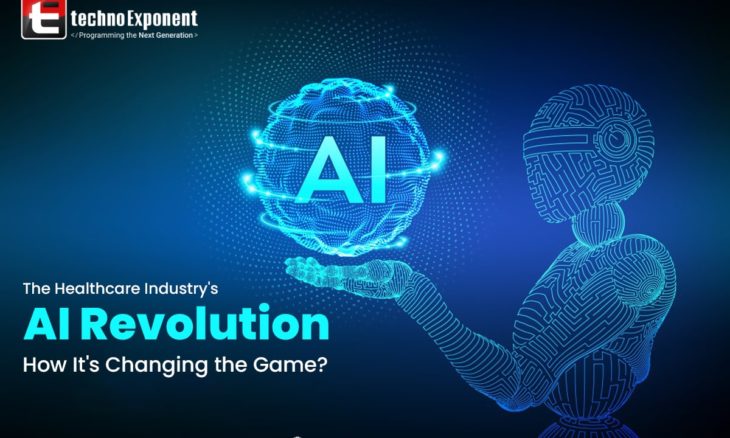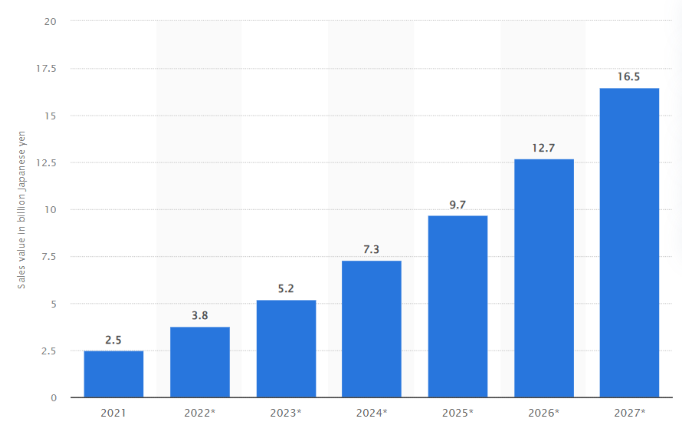
The healthcare industry has undergone a significant transformation in recent years, thanks to the integration of artificial intelligence (AI) technology. AI has revolutionized various aspects of healthcare, from diagnosis and treatment to patient care and administrative tasks. Machines that are programmed to think and learn like humans are referred to as AI. As a result of this development, computer systems are capable of performing tasks typically performed by humans, such as speech recognition, problem-solving, decision-making, and visual perception.
Market Insights: AI Systems for Diagnosis and Treatment Sales in Japan (2021-2027)

The sales value of artificial intelligence (AI) systems for assisting diagnosis and treatment in Japan is expected to experience significant growth from 2021 to 2027. These AI systems play a crucial role in improving healthcare outcomes by providing accurate and timely diagnosis, as well as assisting in the development and implementation of treatment plans.
In 2021, the sales value of AI systems for assisting diagnosis and treatment in Japan is projected to reach 2.5 billion Japanese yen. This growth can be attributed to the increasing adoption of AI technologies in the healthcare sector, driven by the need for more efficient and accurate diagnostic tools.
AI systems for assisting diagnosis and treatment utilize machine learning algorithms to analyze vast amounts of patient data, including medical records, imaging scans, and genetic information, to identify patterns and make predictions. By doing so, healthcare professionals can provide personalized treatment plans and make more informed decisions.
The market for AI systems in Japan is expected to witness a steady growth rate during the forecast period of 2021 to 2027. Factors contributing to this growth include advancements in AI technology, increasing healthcare expenditure, and the growing demand for improved patient care.
Role of AI in Healthcare
AI has significantly advanced in various sectors, and its role in healthcare is increasingly important. It has the potential to revolutionize the way healthcare is delivered, leading to improved patient outcomes, cost savings, and increased efficiency.
Accurate Cancer Diagnosis
One of the significant applications of AI in healthcare is accurate cancer diagnosis. AI-powered algorithms can analyze large amounts of patient data, including medical images, genetic information, and clinical history, to detect cancer at an early stage and provide more accurate diagnoses. This can help healthcare professionals develop personalized treatment plans and improve patient survival rates.
Early Diagnosis of Fatal Blood Diseases
AI can also play a crucial role in the early diagnosis of fatal blood diseases. By analyzing patients. A computer system capable of recognizing speech, solving problems, making decisions, and processing visual information is developed for this purpose to increase the chances of successful treatment.
Customer Service Chatbots
AI-powered chatbots are being increasingly used in healthcare to enhance customer service. These chatbots can provide basic medical information, answer frequently asked questions, and schedule appointments. They offer prompt and reliable assistance, reducing the burden on healthcare professionals and improving patient satisfaction.
Virtual Health Assistants
Virtual health assistants powered by AI are becoming popular in healthcare settings. These assistants can interact with patients, provide reminders for medication, monitor vital signs, and offer guidance on healthy behaviors. They can help patients manage their health conditions and improve adherence to treatment plans.
Treatment of Rare Diseases
AI can greatly aid in the treatment of rare diseases. By analyzing vast amounts of medical literature and patient data, AI algorithms can identify potential treatment options and assist healthcare professionals in making informed decisions. This can significantly improve the quality of care for patients with rare diseases.
Targeted Treatment
AI can help in the development of targeted treatment plans for individual patients. By analyzing patient data, including genetic information and medical history, AI algorithms can identify specific treatments that are most likely to be effective for a particular patient. This personalized approach enhances treatment outcomes and reduces unnecessary side effects.
Automation of Redundant Healthcare Tasks
AI can automate redundant healthcare tasks, freeing up healthcare professionals to focus on more complex and critical tasks. Routine administrative tasks, such as appointment scheduling, data entry, and billing, can be automated, reducing the administrative burden and increasing efficiency in healthcare settings.
Management of Medical Records
AI can assist in the management of medical records, which are often massive and complex. AI algorithms can extract relevant information from medical records, organize data, and provide easy access to healthcare professionals. This improves the speed and accuracy of diagnosis, treatment, and research.
Reduction of Dosage Error
AI can help reduce dosage errors in medication administration. By analyzing patient data, including age, weight, medical history, and drug interactions, AI algorithms can provide recommendations for appropriate dosages, reducing the risk of medication errors and adverse drug reactions.
Robot-assisted Surgery
AI has been instrumental in robot-assisted surgery, where robots assist surgeons during complex procedures. These robots can perform precise movements, provide enhanced visualization, and offer real-time feedback to surgeons. This technology improves surgical outcomes, reduces complications, and shortens recovery times for patients.
Automated Image Diagnosis
AI algorithms can analyze medical images, such as X-rays, MRIs, and CT scans, to assist in the diagnosis of various conditions. By identifying abnormalities and patterns, AI can provide accurate and timely diagnosis, allowing for prompt treatment and improved patient outcomes.
Fraud Detection
AI can be employed to detect fraud in healthcare systems. By analyzing large volumes of healthcare data, AI algorithms can identify suspicious patterns and anomalies indicative of fraudulent activities. This helps prevent fraudulent claims, reduces healthcare costs, and ensures that resources are allocated appropriately.
Clinical Trials
Clinical trials can be designed and executed more efficiently. By analyzing vast amounts of patient data, AI algorithms can identify potential participants, predict treatment responses, and maximize trial protocols. This improves the efficiency of clinical trials, accelerates the discovery of new treatments, and enhances patient recruitment and retention.
Conclusion
AI has a wide range of applications in healthcare, from accurate cancer diagnosis to robot-assisted surgery. It has the potential to transform the healthcare industry, improving patient outcomes, reducing costs, and increasing efficiency. As technology continues to advance, AI will undoubtedly play an even more significant role in shaping the future of healthcare.
 +44 141 628 8980
+44 141 628 8980
 (786) 269-2247
(786) 269-2247
 +61 872007153
+61 872007153
 +91 8900027268 (Sales only)
+91 8900027268 (Sales only)







